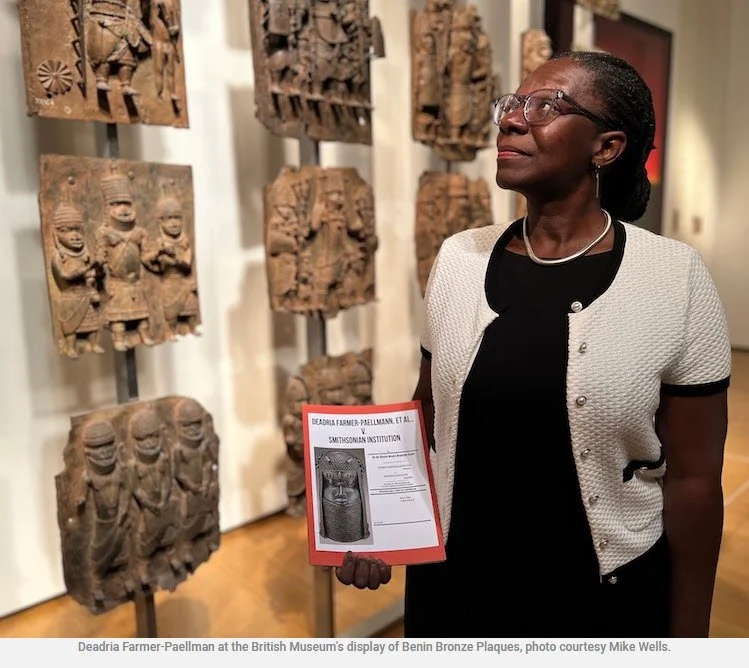U.S. Supreme Court Denies Hearing on Benin Fall 2024
This is an important article written Cultural Property News (culturalpropertynews.org) which I strongly recommend you follow and subscribe to for news in this space . This is the first case I am aware of that was attempting to block repatriation. The situation in Benin is not all that clear, so there may be more efforts like this..
See: https://www.arttrak.com/blog-content/2023/11/repatriation-who-really-has-standing-fall-2023
Efforts by the Restitution Study Group led by Deadria Farmer-Paellman to challenge the Smithsonian Institution’s return of 29 Benin bronzes to Nigeria ended with the United States Supreme Court’s denial of certiorari in a case challenging the Smithsonian Institution’s repatriation of 29 Benin Bronzes to Nigeria.
Deadria Farmer-Paellman at the British Museum's display of Benin Bronze Plaques, photo courtesy Mike Wells.
The case brought by the Restitution Study Group, Inc. (RSG), a U.S. reparatory justice organization, aimed to stop the Smithsonian from returning the bronzes, which were created using metal ‘manilla’ ingots exchanged for enslaved Africans. The petitioners, descendants of enslaved Africans in the U.S., argued that the bronzes are part of their cultural heritage as well – in fact, the direct products of the slave trade – and should remain accessible to them. Furthermore, the RSG argues that the true story of the bronzes, what they stood for and how they were used, is essential to understanding them and that this history will not be told if the bronzes are returned to Nigeria.
Many of the Benin artworks in European and American collections today were taken by British forces in 1897 in a retaliatory raid against the Oba (ruler) of the Benin kingdom, whose allied forces had massacred the British and African members of a diplomatic and trading expedition the prior year. It is posited that this trading expedition threatened to arrive at an inconvenient time, at the start of a major festival involving massive human sacrifices for the honor and security of the rulers of the Benin kingdom.
The rulers of Benin were at that time among the largest slave traders in Africa and famed for their practice of wholesale human sacrifices in which crucifixion and beheading of slaves and prisoners of war were part of traditional royal rituals. In fact, the blood of their victims was used to pour over and anoint these bronzes, which were the private possessions of the rulers and symbols of their hereditary power. The records of the British retaliatory raid describe how thick coatings of dried blood had to be chipped off the ceremonial bronzes in order to see the details that lay beneath it.
The Smithsonian’s return was also originally justified as an act of reparatory justice, in which the museum was doing the right thing by returning looted artifacts to the Nigerian government in the interests of a Nigerian people deprived of their heritage.
In March 2022, the Smithsonian announced plans to work with Nigeria’s National Commission for Museums and Monuments to return the bronzes held by its National Museum of African Art in Washington, D.C. In October 2022, the Smithsonian formally deaccessioned 29 bronzes and committed to repatriating them to Nigeria.
However, just one year later, in March 2023, the then President of Nigeria issued a decree giving absolute title and control of all returned artifacts to the personal ownership of the Oba of Benin, the hereditary ruler of Benin City and direct descendant of the major slave trading rulers of West Africa. In June 2023, nine of the bronzes were put back on display at the Smithsonian on loan from the kingdom of Benin.
Farmer-Paellman says she will continue to work to establish the rights of slave descendants. “The Court’s decision is a setback, but it doesn’t diminish the importance of our cause. These bronzes are our link to learning who we are, and we will continue to fight for permanent access to these relics that connect us to our African heritage.”
The case brought by the Restitution Study Group rested in part on jurisdictional issues – whether courts have authority over the Smithsonian’s actions under its Ethical Return policy and on standing – whether U.S. descendants of enslaved Africans have the legal right to challenge a repatriation that injures their interest. The Restitution Study Group (RSG) argued that despite the Smithsonian’s official transfer of the bronzes to Nigeria, a number of the ‘transferred’ bronzes are still at the Smithsonian. The Supreme Court declined to review a lower court ruling in favor of the Smithsonian, which was upheld by an appellate court.
Lead attorney for RSG Bruce Afran told the press that, “While we are disappointed by the Supreme Court’s decision not to hear our case, we remain committed to challenging the Smithsonian’s power to independently create its own art repatriation policy without public hearing or Congressional approval. We will continue to explore legal avenues to have our concerns addressed.”
Sheila Camorati, a descendant of Benin kingdom captives residing in Germany commented that, “The Supreme Court’s decision underscores the need for a more inclusive ethical return policy that considers the voices of all those affected by the legacy of the slave trade.”
Smithsonian Secretary Lonnie G. Bunch III stated at the time of the repatriation that returning the bronzes was the ethical choice. A Smithsonian spokesperson commented only that the case is now closed.
The case has heightened international awareness about the complexities of repatriating cultural heritage linked to colonial and slavery histories. Farmer-Paellmann and her supporters remain committed to pursuing both legal avenues and the court of public opinion to secure access to these important cultural artifacts for slave descendants.
https://culturalpropertynews.org/u-s-supreme-court-denies-hearing-to-restitution-study-group-on-benin-bronzes/

